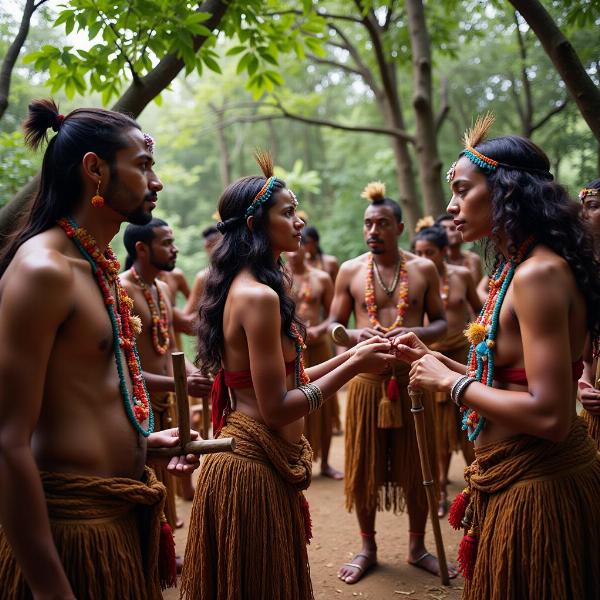Understanding the meaning of “tribal people” in Hindi goes beyond a simple translation. It delves into the rich tapestry of Adivasi culture, their traditions, struggles, and their unique place within Indian society. The term most commonly used is “आदिवासी” (Adivasi), literally meaning “original inhabitants” or “aboriginal people.” This term reflects their deep-rooted connection to the land and their distinct cultural identity.
Exploring the Term “Adivasi” (आदिवासी)
The word “Adivasi” encompasses a vast array of indigenous communities scattered across India, each with its own language, customs, and beliefs. They represent a significant portion of India’s population, preserving ancient traditions and ways of life. Often marginalized and facing socio-economic challenges, Adivasis continue to strive for recognition and the preservation of their cultural heritage. What does it truly mean to be Adivasi? It’s about a shared history, a connection to ancestral lands, and a vibrant cultural identity passed down through generations.
Different Names for Tribal People in Hindi
While “Adivasi” is the most widely accepted term, other words are also used to refer to tribal communities in Hindi. These include “वनवासी” (Vanvasi), meaning “forest dwellers,” which emphasizes their close relationship with the forest ecosystem. Another term is “जनजाति” (Janjati), which translates to “tribe” or “tribal community.” Understanding the nuances of these terms provides a deeper insight into the diverse world of Adivasi people. The choice of term can reflect different perspectives on their identity and relationship with the mainstream society.
The Cultural Significance of Tribal Communities
Adivasi culture is deeply intertwined with nature. Their traditions, rituals, and beliefs often revolve around the forests, rivers, and mountains they call home. Their art, music, and dance reflect their spiritual connection to the natural world and their rich oral traditions. From their intricate handicrafts to their vibrant festivals, Adivasi culture offers a unique glimpse into India’s diverse heritage. It is a testament to their resilience and their enduring connection to their ancestral lands.
 Tribal Culture in India: Traditions and Customs
Tribal Culture in India: Traditions and Customs
Challenges Faced by Tribal People in India
Despite their rich cultural heritage, tribal communities in India often face numerous challenges. These include issues related to land rights, access to education and healthcare, and economic marginalization. Many Adivasi communities are struggling to protect their ancestral lands from encroachment and exploitation. The fight for their rights and recognition continues to be a central aspect of their struggle for survival and cultural preservation.
How can we support Tribal Communities?
Supporting tribal communities requires a multi-faceted approach. Promoting education, healthcare, and sustainable livelihoods are crucial steps towards empowering Adivasi people. Respecting their cultural identity and ensuring their right to self-determination are essential for their well-being. Furthermore, raising awareness about their unique challenges and advocating for their rights can help bring about positive change. Working collaboratively with Adivasi communities is key to ensuring that their voices are heard and their needs are met.
Conclusion: Understanding and Appreciating Adivasi Culture
Understanding the meaning of “tribal people” in Hindi – “आदिवासी” (Adivasi) – is a journey into the heart of India’s rich cultural diversity. By learning about their traditions, struggles, and resilience, we can gain a deeper appreciation for their unique contributions to Indian society. Supporting and empowering Adivasi communities is crucial for preserving their cultural heritage and ensuring their well-being for generations to come.
FAQ:
-
What is the literal meaning of Adivasi? Adivasi literally translates to “original inhabitants” or “aboriginal people.”
-
What are some other terms used for tribal people in Hindi? Other terms include “वनवासी” (Vanvasi) and “जनजाति” (Janjati).
-
What are some of the challenges faced by tribal communities? Challenges include issues related to land rights, access to education and healthcare, and economic marginalization.
-
How can we support tribal communities? We can support them by promoting education, healthcare, sustainable livelihoods, and advocating for their rights.
-
Why is it important to understand Adivasi culture? Understanding Adivasi culture provides insight into India’s diverse heritage and the importance of preserving indigenous traditions.
Relevant Articles:
janapadas meaning in hindi
bichhoo meaning in hindi
sentinelese meaning in hindi
Meaning-Hindi.in is your trusted partner for high-quality Hindi translation services. We specialize in various translation domains, including business and commerce, legal and certified documents, technical manuals, website localization, educational and academic materials, and specialized translations. Our expertise in cultural adaptation ensures accurate and nuanced translations that resonate with your target audience. Need a fast and reliable translation? Contact us today at [email protected] or call us at +91 11-4502-7584. Meaning-Hindi.in is committed to bridging language barriers and facilitating effective communication.